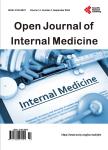Colorectal Cancers in Mauritania: Clinical Aspects and Treatment
Colorectal Cancers in Mauritania: Clinical Aspects and Treatment作者机构:Department of Internal Medicine Abass Ndao Hospital Centre Cheikh Anta Diop University Dakar Senegal Department of Internal Medicine Nouakchott National Hospital Centre Nouakchott Mauritania
出 版 物:《Open Journal of Internal Medicine》 (内科学期刊(英文))
年 卷 期:2016年第6卷第4期
页 面:139-146页
学科分类:1002[医学-临床医学] 100214[医学-肿瘤学] 10[医学]
主 题:Colorectal Cancer Diagnosis Prognosis Mauritania
摘 要:The aim of our study was to determine epidemiological, clinical and therapeutic profile of colorectal cancers in Mauritania. Patients and Methods: It was a retrospective multicentric study conducted over 5 years in Nouakchott National Hospital Centre and in private clinics of Mauritania. All cases of colorectal cancers histologically confirmed were included. The Astler and Coller classification was used to classify lesions by level of extension. Results: 225 patients were included with a sex ratio (M/F) of 1.39, an average age of 52.3 years. Location of the lesion was rectal (37.7%) and colonic (62.3%). Clinical manifestations were dominated by rectal bleeding (26.9%), occlusive syndrome (16.5%) and transit disorders (11.6%). Endoscopic lesions were of stenosing (45.2%), ulcero-burgeoning (39%), ulcerous (7.5%) and burgeoning (4.7%) types. Histological profiles were adenocarcinoma (88.9%), carcinoma (3.1%) and lymphoma (2.6%). The work-up for extension revealed metastasis in 33.6% of cases. These were stage B (49%) and C (36%) among the 95 cancers that received the Astler and Coller classification. The treatment was curative (80.83%) and palliative (19.16%). Conclusion: Colorectal cancer is a reality in Africa. However, its diagnosis still remains delayed, which increases the prognosis, hence the need to promote screening tests.



